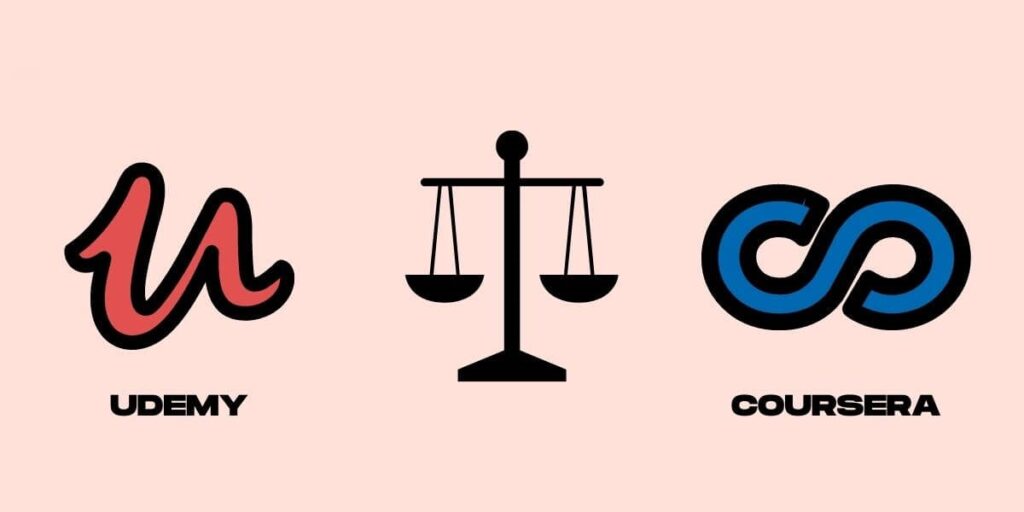Udemy vs. Coursera – which one is for you? There are so many MOOC platforms out there now it can be quite confusing for learners to decide which route to take for their specific online learning goals. Udemy, of course, is one of the most well-known platforms. So is Coursera. The Udemy Coursera battle is tough and has a lot of pros and cons. In this article, we will provide an overview of the key differences between Udemy vs. Coursera.
Udemy vs Coursera – Education Goals
This is the primary difference between Udemy vs. Coursera.
Udemy is a unique global course marketplace for anybody who wants to teach or learn online. With its “lifetime learning” offer it provides students with the ability to learn just about whatever they can think of, on the go, always at their own pace and on their own terms. Udemy also offers anybody a way to share their knowledge with the world by creating a course, provided they meet its quality and other requirements and the course is created within its proprietary platform. Udemy also offers businesses a subscription to its best business courses to allow employees to pick and choose what skills they wish to improve on.
On the other hand, Coursera is an academic education platform that partners with top universities and educational organizations such as Stanford and HEC Paris, as well as corporations such as IBM, to offer curated courses. Like Udemy, anyone can take these courses, but the learning set up is more structured and akin to attending a college/university where you would take a course with clear deadlines over several weeks or months.
Unlike Udemy, Coursera’s platform and learning environment have been designed based on proven teaching methods verified by top researchers. Students will have structured classes with due dates and grades and consequences for missed assignments and poor performance.
Coursera vs Udemy – Number and Type of Courses

When it comes to Udemy vs. Coursera’s topic offering, Udemy wins with its mass appeal offering over 100,000 highly diverse courses in dozens of languages from beginner to advanced levels. Courses can take an hour or months to complete. There are thousands of courses are free for individuals who are willing to learn.
Coursera, being tied to education institutions, offers around 2,500 courses with over 250 “specialization” tracks, such as Data Science. A Coursera specialization is a mini-credential or certification program that combines several courses and sometimes a Capstone project into a group. Shorter specializations can include as few as three courses and take 4-6 months to complete. On the other hand, some specializations can go as long as 10 courses and may take a year or two and 40-80 hours to complete.
Coursera also offers courses a handful of degree programs, but most courses are beginner level. It also offers its courses in a large number of languages.
Udemy vs Coursera – Audience/Students

Udemy is targeting the diverse global masses in terms of course topics offered, level of education, motivation to learn, instructor background and more. Its goal is to sell as many qualified courses as possible to as many people as possible. Generally, people using Udemy will be looking to explore a subject area without the burden of being in an academic setting with associated performance pressures. That said, some Udemy instructors are well known and reputable and students will seek out their courses to seriously deepen their knowledge or even change careers.
Coursera students are generally more academically-minded and looking for a more structured and accredited learning program and/or access to top-notch professors. That said, like Udemy, Coursera does offer free courses for anyone to take at their own pace to explore a topic, but usually as part of a specialization program. Most people coming to Coursera will have in mind a degree path or certification.
Udemy vs Coursera -Instructor/Student Interaction
Udemy restricts instructors in its communications with students. Instructors do not have student email addresses and are limited in the number of promotional emails they can send out, and what can be communicated in them. Students do not receive grades and feedback on assignments from instructors, but they can ask questions and engage in online messaging with instructors through the platform. That said, instructor communication with students is varied and not mandatory.
Interaction with instructors mirrors more a typical college course on Coursera. Students can interact with their instructors in chats and watch live videos. They submit assignments for review and grading and receive immediate feedback on these. They can receive peer feedback on assignments and discuss with other students. They can also access course mentors for assistance, not unlike a teaching assistant in the real world.
Coursera vs Udemy – Course Completion Certificates

Udemy does not offer accredited certificates, only a certificate of completion upon finishing a course. These certificates do not hold the same weight with employers or otherwise compared to certificates from Coursera or major educational institutions.
Coursera offers recognized certificates from an accredited institution. It is structured when it comes to the certification process and even offers degree programs. In essence, the certification process is much like that of any educational institutions.
When students sign up and pay for a course and then complete it with graded assignments within 180 days, they will receive their certification. Coursera certificates thus hold some value. The downside is that if you do not complete your course within 180 days of paying, you will have to pay again to earn your certificate. And you only get a certificate if you pay for the course and do all the homework.
Udemy vs Coursera – Pricing

Udemy is infamous for its Black Friday and January sales as well as its constant very low course prices. Udemy’s pricing is really geared towards generating high volume enrollments. It also offers thousands of free courses. Pricing for all courses is also visible from the course search landing pages.
Coursera has a mixed pricing offer. Individual courses and specialization paths vary in pricing. You have to be logged in and click on “enroll” for a course to see its price. Courses that are part of a larger specialization may be available on a monthly subscription basis (approximately $39-$79), or for individual purchase. They are more costly than Udemy courses.
Coursera also offers financial aid for those who cannot afford to enroll and who qualify. Finally, you can audit many courses for free and only pay if you want the certificate. However, you will not have access to assignments, graded quizzes, etc.
Udemy vs Coursera – Course Availability
Clearly, on Udemy all courses and content can be accessed at any time and once you purchase a course, you own it forever.
On Coursera, many courses have specific start and end dates. Some courses only make their material available when the course is running, so you may have to wait a long period (sometimes months) for your course to be offered. Other courses are offered at any time, but you may not have as much engagement with other students and mentors during the “off” times.
Udemy vs. Coursera – Is One Better?
Really for students, the answer of Udemy vs. Coursera comes down to what you are looking to get from an educational platform. In summary…
Udemy is better for those who have a specific learning interest or a non-academic hobby, such as yoga or programming, and want to try out the subject. There are simply many course topics that would not normally be offered by an educational institution, such as eSports or Microsoft Excel.
Another reason people use Udemy is to skill up in an area they have motivation or reason to do so, but without begin bogged down with time and work constraints. Udemy courses are also simply more affordable in general. You can get a masterclass in web development for very little money.
All this said there are a few disadvantages to Udemy. The quality of courses can vary greatly. Course reviews help to mitigate this risk somewhat. Additionally, the lack of structure and low prices means that many students don’t finish their courses. Finally, the certificates of completion hold little value when it comes to resume building.
Coursera is more about teaching and learning from academic courses such as accounting or psychology, much like in a university or college program. It’s for people who are looking for a structured and accredited learning experience that allows some freedom and access to content from top universities and instructors that they may otherwise not have access to. A benefit is that not only is it a lot cheaper, but you can avoid the painful college application process. This means you can avoid taking the SAT or ACT, applying for scholarships, and save money in college application fees as well. Some of its courses are even accepted for academic credit at institutions. That said, once enrolled in many courses, you are committed and have limited freedom over your time.
For those who want to know which one is “better”, it will come down to what you want to achieve from the online education experience.


4 Comments
Will the certificate provided by these sites be valuable to immigration to any country?
Thank you for visiting our blog. While we are not experts in immigration and do not provide advice on immigration requirements, we can say that taking online courses that improve skills can improve job and career prospects for some and contribute to your personal resume.
Appreciate the way you gave the insight,
Seems it will be good comparison points to the students that are completely newbie as like me.
Thank you, great detailed overview.